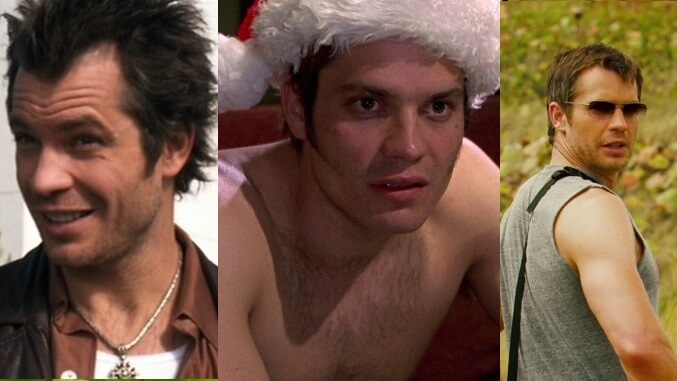Before He Was Raylan Givens, Timothy Olyphant Justified a Movie Career as the New Bill Paxton

Though the cautionary tales of your David Carusos and your Matt LeBlancs still reverberate through the sometimes-contentious history of movie/TV cross-pollination, there can be something gratifying about an actor definitively choosing a medium that fits, whether it’s Julia Louis-Dreyfus winning Emmys across three different sitcoms while virtually ignoring the movies, or George Clooney trading ER for Steven Soderbergh and barely looking back. By most evidence, Timothy Olyphant is, without shame, a TV guy: He’s starred in two all-time classics with Deadwood and Justified with sidelines in the well-liked Santa Clarita Diet and a recurring role in multiple Star Wars shows. His recently-wrapped return to Raylan Givens in Justified: City Primeval further solidifies his status as both a major TV star and a great TV actor, able to imbue small gestures with charisma and nuance, doing a lot within a familiar emotional range. Even when the writing and pacing of City Primeval hasn’t always lived up to the terrific series that preceded it, Olyphant’s Raylan makes for an unshakeable anchor, both reliable and, within the world of the show, reliably stubborn.
That Givens sometimes feels like a cowboy out of time, while the newest show built around him pushes against his roguish individualism, parallels the film career that Olyphant more or less left behind. He still appears in movies, but seems content to take smaller parts in ensembles for the likes of Quentin Tarantino or David O. Russell, rather than maximizing his big-studio screen time. But before Justified debuted in 2010, and lacking a steady supply of big-screen Westerns where he might have fit perfectly, Olyphant was riding the line between potential movie star and imminent That Guy. He popped up in a Scream sequel, a Jennifer Garner rom-com, a videogame adaptation, and the occasional hushed, reflective indie, among many others. Looking at certain moments of his pre-Raylan film career is instructive in his later development as a memorable leading man.
“Lead” was usually the sticking point; “memorable,” he didn’t have a problem with. Though Scream 2 put a spotlight on Olyphant in only his third feature film (just a few months earlier, he had a bit part as a hiker in the Danny Boyle flop A Life Less Ordinary), he pops even more in a youth-culture movie far fewer people saw: Doug Liman’s Go. The film came in just under the wire in 1999 to take the title of best Pulp Fiction knock-off of the decade, and, befitting its lower-stakes crime plot, Olyphant was on hand to play the skinny-white-dude version of Marsellus Wallace: Drug dealer Todd, who menaces Ronna (Sarah Polley) over some lost pills, flirts with Ronna’s friend Claire (Katie Holmes) via Breakfast Club references, and expounds upon his hate-reading of the single-panel comic strip The Family Circus. It’s the kind of material, in other words, that feels like shtick in so many other crime comedies, and Olyphant imbues with actual life here. It’s genuinely difficult to tell whether Todd is more interested in exacting harm upon Ronna or making out with Claire, and not because Olyphant plays Todd as openly, quirkily conflicted. Fitting with the movie’s chronicle of youthful whims, he’s acting on impulse and pretending he has a greater plan.
As is often the case, an eye-catching performance led to typecasting, with Olyphant playing criminal types in A Man Apart and The Girl Next Door, culminating in an underplayed turn as the bad guy in Live Free or Die Hard. What’s missing from his work in Die Hard 4 is exactly what made him seem like inspired casting in that role: His live-wire intensity, and a freewheeling intensity to match. In A Man Apart and The Girl Next Door, he’s essentially playing less wittily rendered versions of Todd, whether peddling harder drugs in Man Apart or porn in The Girl Next Door. He sports tight shirts, spiky hair, and an alternately drawling and manic delivery style that forges a clear connection to the late, great Bill Paxton. A Man Apart is a Vin Diesel vengeful-cop picture that’s unremarkable almost to the point of indifferent incoherence, but a standard scene where a sleazebag called Hollywood Jack (Olyphant) mouths off to a seething “good” guy (Diesel) is enlivened multiple times over, first by Olyphant’s insouciance and then by his Paxton-like vocalizing of his frantic cowardice. It’s standard stuff, and Olyphant’s scenes are practically the only ones in the movie where that feels like its cliché-ridden approach might actually work.
-

-

-

-

-

-

-

-

-

-

-

-

-

-

-

-

-

-

-

-

-

-

-

-

-

-

-

-

-

-

-

-

-

-

-

-

-

-

-

-








































